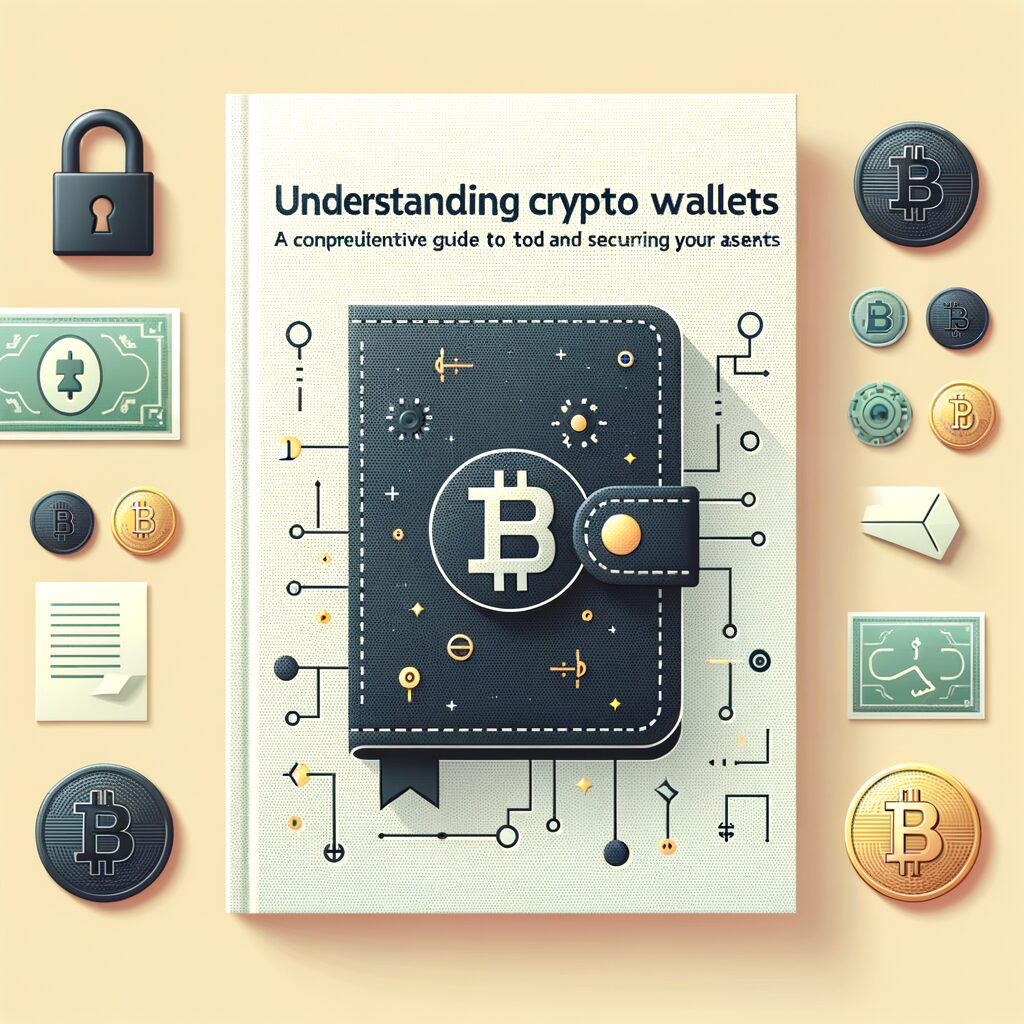
“Master Your Digital Wealth: The Ultimate Guide to Crypto Wallets – Secure, Store, and Soar”
The Ultimate Guide to Crypto Wallets: Exploring Different Wallet Types for Digital Asset Storage
Understanding Crypto Wallets: A Comprehensive Guide to Storing and Securing Your Assets
In the burgeoning world of cryptocurrency, the significance of secure asset storage cannot be overstated. Crypto wallets, the cornerstone of interacting with digital currencies, offer a means to manage and protect these assets. As the linchpin of cryptocurrency transactions, they are essential for both novices and seasoned investors to understand.
At their core, crypto wallets do not store the actual coins but rather the cryptographic keys – public and private keys – that prove ownership and allow for transactions. The public key can be shared and is akin to an account number, while the private key is akin to a PIN and must be kept confidential to ensure the security of one's assets.
The landscape of crypto wallets is diverse, with each type offering distinct advantages and trade-offs in terms of convenience, security, and control. Hot wallets, which are connected to the internet, provide ease of access and are ideal for frequent traders. These include desktop wallets, which are software programs installed on a computer, and mobile wallets, which operate as apps on smartphones. While their connectivity facilitates quick transactions, it also renders them more susceptible to online threats such as hacking.
Conversely, cold wallets are not connected to the internet and thus offer enhanced security. Hardware wallets, physical devices that store keys offline, are a popular choice for their robust protection against cyber attacks. Paper wallets, though less common today, involve printing out the public and private keys on paper, effectively creating a physical backup. These cold storage options are particularly suited for long-term investors seeking to safeguard large amounts of cryptocurrency.
Moreover, there are hybrid solutions like web wallets, which are accessible through browsers and can be hot or cold, depending on whether the keys are stored online or offline. Additionally, some exchanges provide wallet services, allowing users to store and trade cryptocurrencies within the platform. However, this convenience comes with a caveat: users must trust the exchange's security measures and may not have full control over their private keys.
The choice of wallet is a balancing act between accessibility and security. Users must also consider the wallet's compatibility with different cryptocurrencies, as not all wallets support every coin. Furthermore, the user interface and experience can vary significantly, making some wallets more suitable for beginners and others for those with technical expertise.
Regardless of the wallet type, best practices in security are paramount. This includes using strong, unique passwords, enabling two-factor authentication, and keeping software up to date. Regularly backing up the wallet, especially the private keys, is crucial to prevent loss of assets due to device failure or theft. For added security, some users opt for multisignature wallets, which require multiple keys to authorize a transaction, thereby distributing risk.
In conclusion, understanding the various types of crypto wallets is essential for anyone looking to participate in the digital asset space. Each wallet type offers a different approach to storing and securing cryptocurrencies, and the choice depends on individual needs and preferences. By carefully considering the trade-offs between convenience and security, users can select a wallet that best suits their investment strategy and ensures the safekeeping of their digital assets. As the crypto ecosystem evolves, staying informed and vigilant about wallet security will remain a top priority for all participants.
Security Best Practices for Crypto Wallets: How to Protect Your Digital Assets

Understanding Crypto Wallets: A Comprehensive Guide to Storing and Securing Your Assets
In the burgeoning world of cryptocurrency, the security of digital assets is paramount. Crypto wallets, the tools for storing and managing these assets, are the linchpin in the ecosystem, safeguarding the keys that represent ownership and control over digital currencies. As such, understanding the security best practices for crypto wallets is essential for anyone looking to protect their investments from theft, fraud, and unauthorized access.
First and foremost, it is crucial to comprehend the different types of crypto wallets available. Broadly speaking, wallets can be categorized into two groups: hot wallets and cold wallets. Hot wallets are connected to the internet and provide convenience for frequent transactions, but they are more vulnerable to online attacks. Conversely, cold wallets are offline storage solutions, such as hardware wallets or paper wallets, which offer enhanced security by reducing exposure to online threats.
Regardless of the type of wallet one chooses, there are several key practices that should be followed to ensure maximum security. One of the most important is the use of strong, unique passwords. Passwords are the first line of defense against unauthorized access, and using a combination of letters, numbers, and special characters can significantly reduce the risk of being compromised. Additionally, it is advisable to change passwords regularly and avoid reusing them across different platforms.
Another critical security measure is the implementation of two-factor authentication (2FA). This adds an extra layer of security by requiring a second form of verification, typically a code sent to a mobile device, in addition to the password. This makes it much harder for potential attackers to gain access to a wallet, even if they have obtained the password.
Moreover, keeping the wallet's software updated is essential. Developers regularly release updates that patch vulnerabilities and enhance security features. Failing to install these updates can leave wallets exposed to attackers who exploit outdated software. Therefore, users should enable automatic updates or regularly check for new versions of their wallet software.
Backing up the wallet is another vital practice. In the event of device failure, loss, or theft, having a backup allows users to recover their funds. This should be done by copying the wallet's private keys or seed phrases, which are a series of words that can restore a wallet's contents, and storing them in a secure location. It is recommended to have multiple backups and to keep at least one in a different physical location to protect against natural disasters or theft.
Furthermore, users should be wary of phishing attempts and malware. They should never click on suspicious links or download attachments from unknown sources, as these can compromise wallet security. It is also advisable to use a dedicated computer or device for managing crypto assets to minimize the risk of exposure to malicious software.
Lastly, for those holding significant amounts of cryptocurrency, considering the use of a multisignature wallet may be wise. This type of wallet requires multiple private keys to authorize a transaction, providing an additional safeguard against theft, as a hacker would need to compromise several devices or accounts to access the funds.
In conclusion, the security of crypto wallets is not to be taken lightly. By employing strong passwords, enabling two-factor authentication, keeping software up to date, backing up wallet data, staying vigilant against phishing and malware, and potentially using multisignature wallets, users can significantly enhance the security of their digital assets. As the crypto landscape continues to evolve, staying informed and adopting these best practices will be instrumental in protecting one's investments in the digital realm.
Navigating the World of Digital Asset Storage: Choosing the Right Crypto Wallet for You
Understanding Crypto Wallets: A Comprehensive Guide to Storing and Securing Your Assets
In the ever-evolving landscape of digital currencies, the importance of secure and efficient storage solutions cannot be overstated. Crypto wallets are essential tools for anyone looking to engage with the world of cryptocurrencies, as they provide the means to store, send, and receive digital assets. With a plethora of options available, choosing the right crypto wallet for your needs is a critical decision that requires a clear understanding of the different types of wallets and the security features they offer.
At the core, a crypto wallet is a digital interface that interacts with various blockchains, enabling users to manage their digital currencies. It stores private and public keys, which are necessary for executing transactions. The public key can be shared with others to receive funds, while the private key is akin to a password that should be kept secret, as it allows the owner to access and control their assets.
There are two main categories of crypto wallets: hot wallets and cold wallets. Hot wallets are connected to the internet and provide convenience and quick access to assets, making them suitable for frequent traders and those engaging in daily transactions. However, this constant connectivity also makes them more vulnerable to online threats such as hacking and phishing attacks. On the other hand, cold wallets are offline storage solutions, such as hardware wallets or paper wallets, which provide an additional layer of security by being inaccessible to online threats. They are ideal for long-term storage of large amounts of cryptocurrencies.
When selecting a crypto wallet, one must consider the balance between security and convenience. For those prioritizing security, hardware wallets offer robust protection. These physical devices store private keys offline and are immune to computer viruses and malware. They can be connected to a computer or smartphone when transactions need to be made, ensuring that private keys never leave the device. Paper wallets, although less common nowadays, are another form of cold storage. They involve printing out the public and private keys on paper, which is then stored in a safe place. However, they are not as user-friendly and can be susceptible to physical damage or loss.
Software wallets, which include desktop, mobile, and web wallets, are more user-friendly and easily accessible. Desktop wallets are installed on a personal computer and provide control over the assets, but they require regular backups and strong antivirus protection. Mobile wallets, apps on smartphones, offer portability and features like QR code scanning, but they depend on the security of the mobile device. Web wallets run on cloud servers and can be accessed from any device with internet connectivity, offering convenience at the cost of control, as the wallet provider manages the private keys.
Security is paramount when dealing with digital assets. Regardless of the type of wallet chosen, it is imperative to implement best practices such as using strong, unique passwords, enabling two-factor authentication, and keeping software up to date. Regular backups of the wallet's information are also crucial in case of device failure or loss.
In conclusion, the choice of a crypto wallet is a personal one that should align with your individual needs and the level of risk you are willing to accept. Whether opting for the convenience of a hot wallet or the security of a cold wallet, understanding the features and potential vulnerabilities of each type is essential. By carefully considering these factors and adhering to security best practices, you can ensure the safekeeping of your digital assets in the dynamic world of cryptocurrency.
Advanced Asset Protection: A Deep Dive into Crypto Wallet Security Features
Understanding Crypto Wallets: A Comprehensive Guide to Storing and Securing Your Assets
In the realm of digital currencies, the significance of security cannot be overstated. As the bridge between the user and their digital assets, crypto wallets play a pivotal role in the safeguarding of cryptocurrencies. These wallets store the cryptographic keys necessary for interacting with blockchain networks, enabling users to send, receive, and manage their digital assets. However, the security features of these wallets are what truly determine the safety of one's investments.
To begin with, crypto wallets can be broadly categorized into two types: hot wallets and cold wallets. Hot wallets are connected to the internet and provide convenience for frequent transactions, but they are more vulnerable to online threats. Conversely, cold wallets are offline storage solutions, such as hardware wallets or paper wallets, which offer enhanced security by reducing exposure to online risks. The choice between hot and cold storage often depends on the balance between the need for accessibility and the level of security desired.
Advanced security features in crypto wallets are designed to thwart unauthorized access and protect users' assets from various attack vectors. One such feature is two-factor authentication (2FA), which adds an extra layer of security by requiring a second form of verification in addition to the password. This could be a text message, an email, or a notification from an authenticator app. By implementing 2FA, even if a hacker manages to obtain a user's password, accessing the wallet would still be challenging without the second verification step.
Moreover, multi-signature wallets, commonly referred to as multi-sig, require multiple private keys to authorize a transaction. This feature is particularly useful for organizations or groups where the consent of several parties is necessary to execute transactions. It not only enhances security by distributing trust but also provides a system of checks and balances among the key holders.
Another critical aspect of wallet security is the recovery phrase or seed phrase. This is a series of words generated by the wallet that allows users to recover their funds in case the wallet is lost or damaged. It is imperative that this recovery phrase is stored securely and never shared with anyone. Some users opt to split the phrase and store it in multiple secure locations to mitigate the risk of total loss due to theft or natural disaster.
Encryption is also a cornerstone of wallet security. Wallets encrypt the private keys with a password, ensuring that even if someone were to gain access to the wallet file, they would not be able to retrieve the keys without the password. Users are advised to create strong, unique passwords and change them regularly to maintain optimal security.
Furthermore, regular software updates are crucial for maintaining wallet security. Developers continuously work to identify and patch vulnerabilities, and keeping the wallet software up to date ensures that users benefit from the latest security enhancements and features.
In conclusion, understanding and utilizing the advanced security features of crypto wallets is essential for anyone looking to protect their digital assets. From choosing between hot and cold storage to leveraging 2FA, multi-sig, secure recovery phrases, encryption, and software updates, each layer of security plays a vital role in defending against potential threats. As the cryptocurrency landscape evolves, so too must the strategies for asset protection, ensuring that users can navigate this innovative space with confidence and peace of mind.


